New-style police have key role in Ukraine
- Published
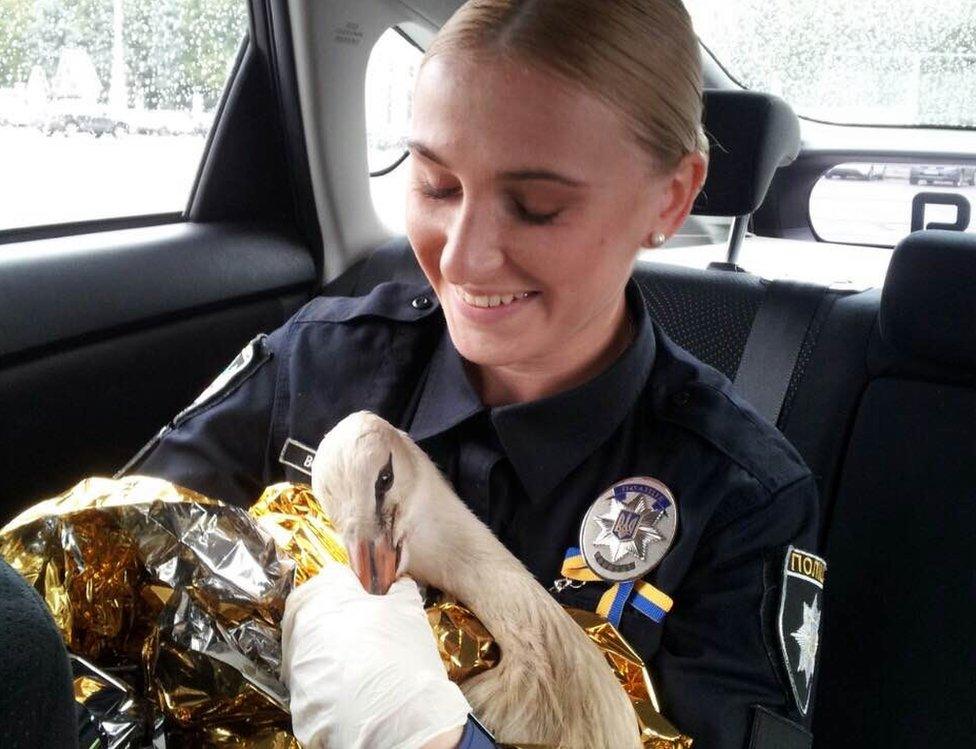
Valerie Voloshchuk on a mercy mission
When police officer Valerie Voloshchuk puts on her smart navy uniform in the morning, twists her blonde hair into a neat bun and fixes her pearl earrings, she never quite knows what will await her on patrol.
The 27-year-old former lawyer and one-time air stewardess has been in this job only a few months.
And like the other fresh-faced recruits of Ukraine's new police force, she's been trained to deal with all sorts of trouble.
"It can be stressful at first," says Eka Zguladze, the Deputy Interior Minister who is almost as young and has transferred to Ukraine the lessons she learned when rolling out a similar police reform programme in Georgia a few years ago.
"For some, it's seeing death for the first time, or arresting an armed man, or coping with a small child who has swallowed his tongue before the medics arrive.
"But since the new force has been on Kiev's streets, there's not been one allegation of corruption."
Deputy Interior Minister Eka Zguladze says the new police are different
It is very different from Ukraine's old "militsiya" police force who were more likely to harass you for a bribe than help maintain law and order.
On Valerie's belt is a pistol. Pinned to her shoulder is a tiny camera constantly monitoring her performance and recording the often colourful behaviour of the miscreants these new recruits have to deal with. The video is posted on social media and broadcast on a reality TV show.
One clip shows a police patrol car stopping a drunk driver, external slumped behind the wheel.
First he tries to get them to talk to his "powerful contacts" on his phone. Then when they move in to arrest him, he suddenly pulls a gun on them. It turns out that he himself is a long-standing law enforcement officer, attached to the Interior Ministry - he shows them his badge.
In the end they manage to disarm him and lead him away.
Public support
Not surprisingly cases like this have gone down well with the public.
The number of emergency calls requesting police help has quadrupled.
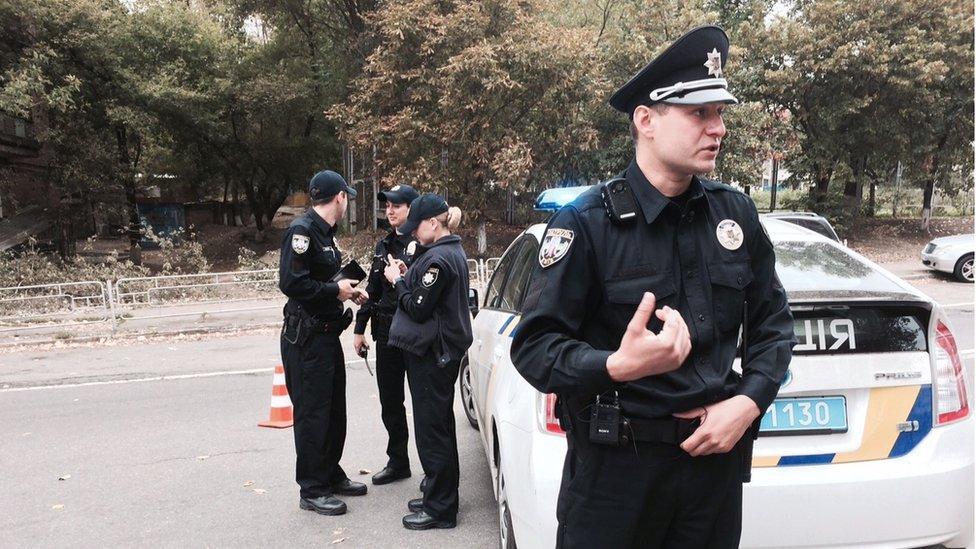
The public have responded well to Ukraine's new police force
Part of the aim is to increase public respect for law and order. So far, in Kiev at least, it seems to be working.
But today Valerie isn't fighting criminals. The highlight of her day was helping a bird in distress.
A large, ailing stork had been found by the roadside. It seemed to be cold or malnourished.
She wrapped it in an emergency foil blanket and drove it to the vet near the zoo.
"You never know what awaits you when you go out on patrol," she says, "It's all so interesting."
Her colleague Valery Vilkevich, 30, is also an animal lover.
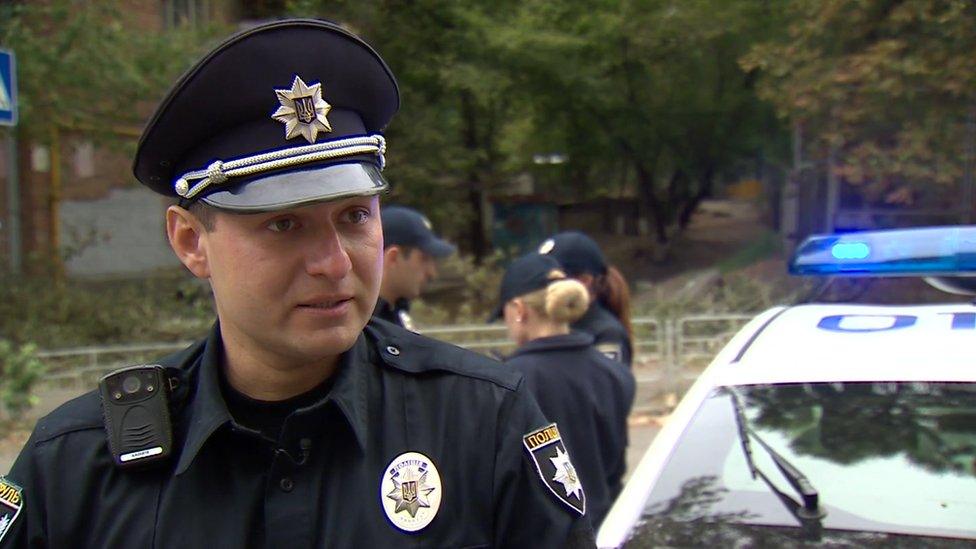
Valery Vilkevich says the new police are trained to be "helpful and peaceful"
A former biology student, he moved to New York to stay with his uncle and dreamed of joining the city's police force.
He even did an internship with them. But Manhattan was no place to pursue his passion for breeding carrier pigeons.
So when he heard about the new police force being set up in Kiev, he flew back to join up.
Public relations exercise
Today his first call-out was for a case of alleged anti-social behaviour - a complaint that workmen repairing a flat were chucking rubbish out of a third floor window.
Three Prius police cars (courtesy of Japan) with their blue lights flashing converged on the courtyard. Five police charged up the stairs.
It was clearly overkill, especially when they could find no wrongdoing. But the woman who had summoned them was grateful anyway.
And part of the aim is to be seen to be visible and ready to help - a public relations exercise.
Next call-out was for a dispute between neighbours.
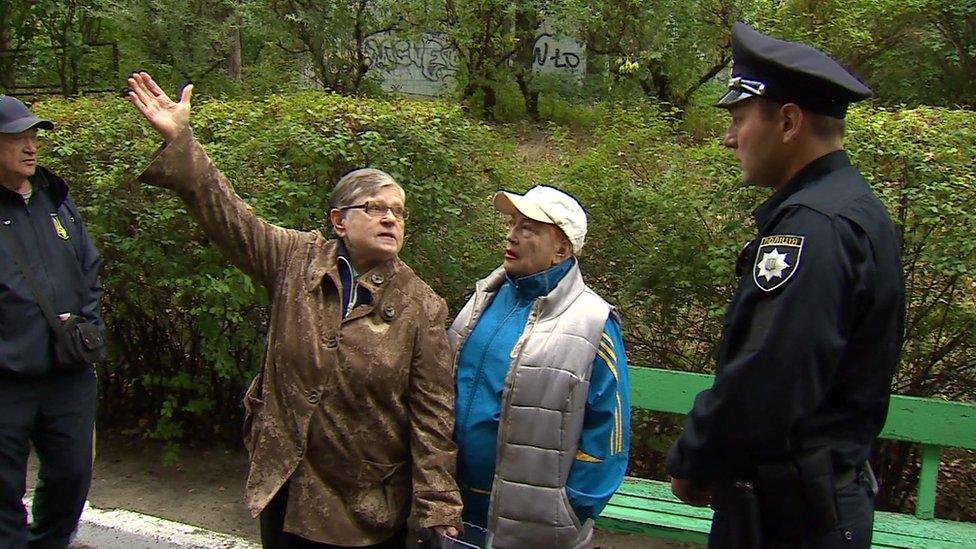
Some neighbourly disputes may have political undercurrents
It too seemed trivial enough - an old lady angry because the man next door had constructed a balcony that obscured her access to sunlight.
He had called the police because he said she kept verbally abusing his wife and toddler.
In fact there was a political undercurrent. He was from Russian-speaking Donetsk in the East and she was a Ukrainian-speaking patriot.
"She is insufferable!" said the man.
"Just look what that scumbag did!" complained the woman.
"No need to use insulting language," said Valery, trying to calm them down.
As they continued to raise their voices, he rolled his eyes and cocked a mock gun to his forehead to signal he had had enough.
"We are trained to be helpful and peaceful," he explained later.
Huge corruption
These young recruits have to play the part of social workers as well as law enforcement officers - a much needed social service for citizens who never before have had someone in authority prepared to listen patiently to their daily woes.
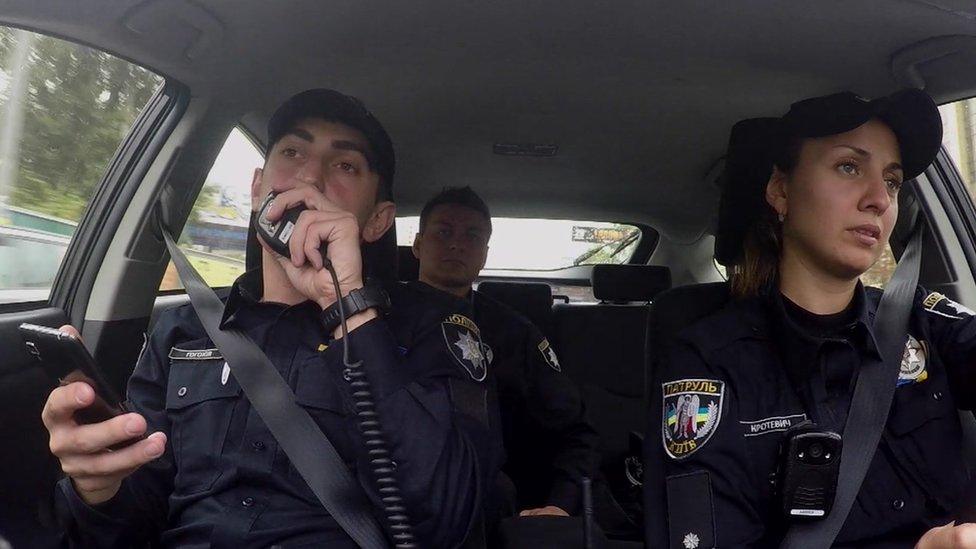
The new recruits' encounters are recorded and the videos are posted on social media and broadcast on a reality TV show
But it is also an expensive use of police time and possibly a distraction in a place deluged by bigger problems.
Ukraine also needs to get to grips with the large scale corruption and smuggling which have blighted its economy.
This is a country desperately trying to remake itself on all fronts at once, against the odds and against the clock.
Ms Zguladze is optimistic. The police reform is going so well that she has speeded up the rate at which it will be expanded across the country.
It is an ambitious vision.
Only 2,000 officers covering Kiev so far and another 2,500 for Odessa, Lviv and Kharkiv either in training or starting to hit the streets.
But how many more will be needed to cover a country of 42 million people?
And for all the flashing blue lights on their cars, their energy and compassion, these patrol officers have limited powers.
When they arrest someone, they take them to the local precinct to be processed by the old militsiya, with whom they are barely on speaking terms.
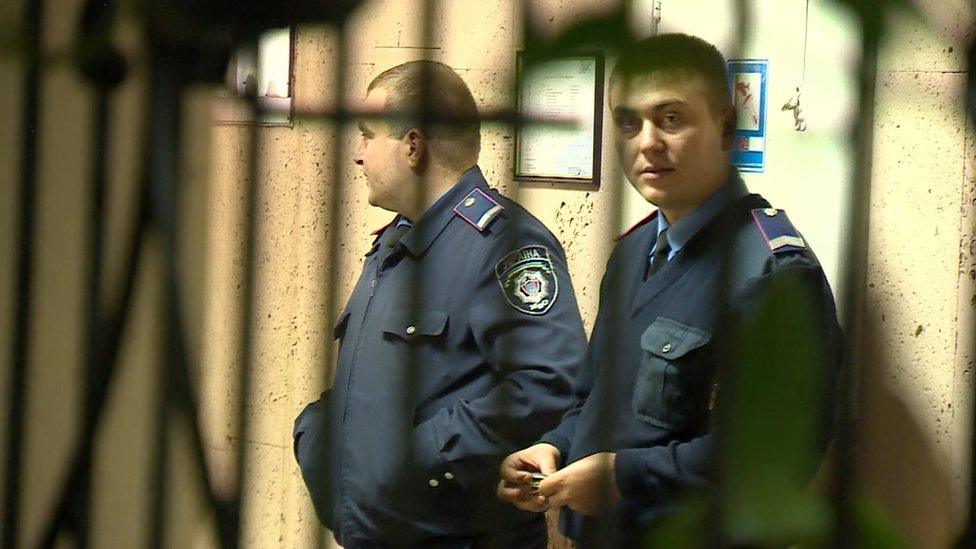
The old police still run the precinct - relations between them and the new patrol police are difficult
"Sometimes at the precinct, the detainees we've brought in are released before we've even done the paperwork," said Badri Gogokhiya, a former philosophy teacher aged only 22, but already in command of his team.
The old guard in the back offices know they are on the way out.
Why should they co-operate?
And how long before they actively try to sabotage these reforms, especially in towns far away from Kiev and the careful scrutiny of Ms Zguladze's Ministry?
This is one small reform among the many which Ukraine is trying to implement.
It is the best tangible example of success and so it has been seized upon by the government to convince the population that the country really has started to change for the better.
But there is a very long way to go.